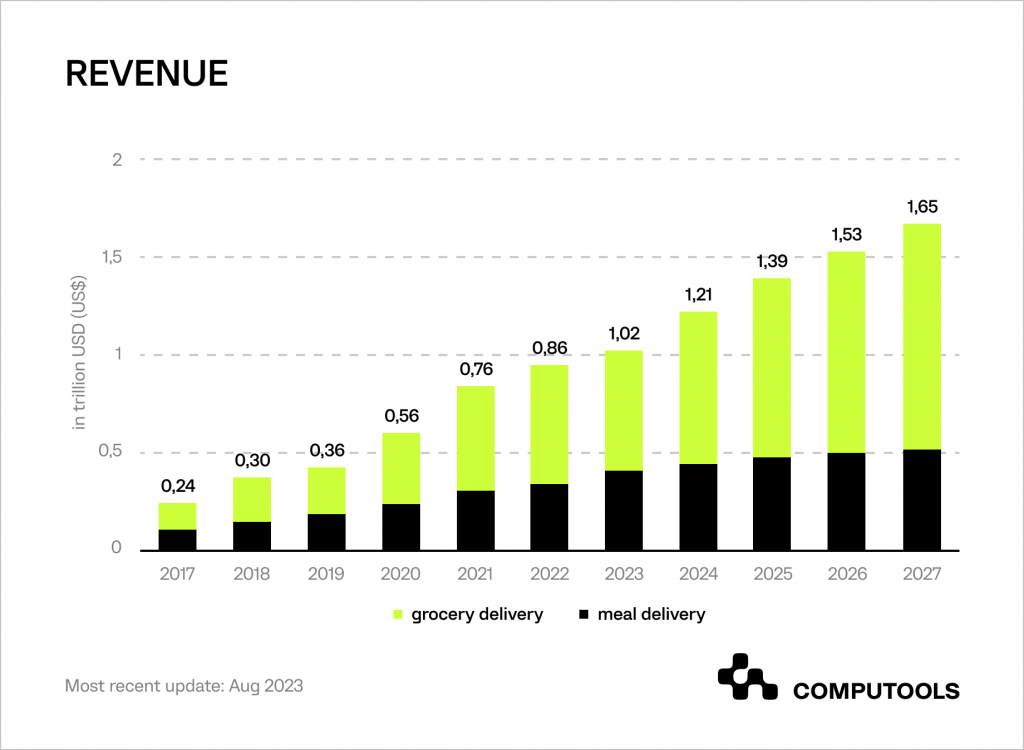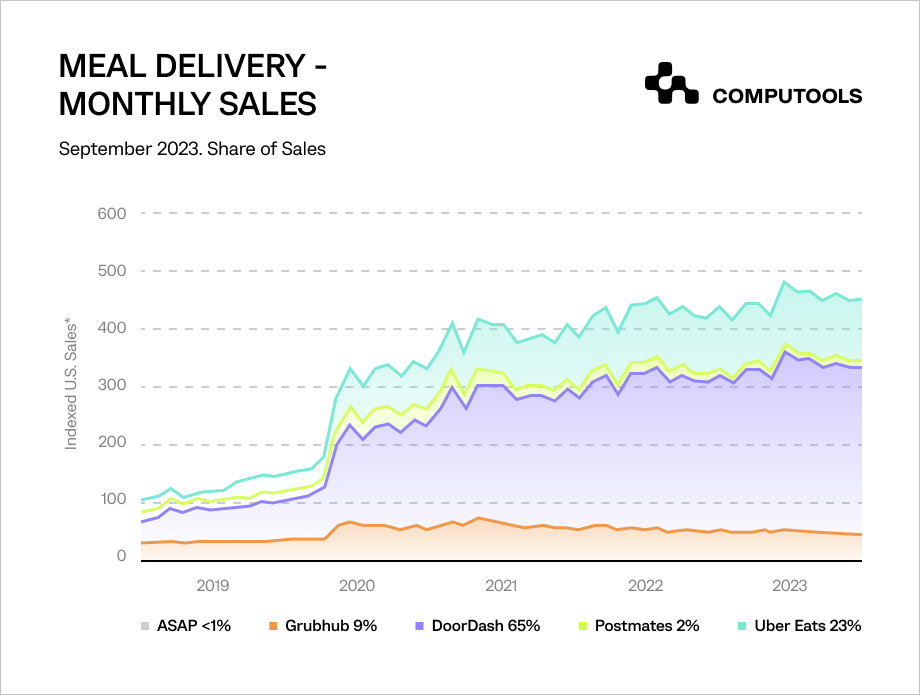Just as love and care are the secret ingredients for delicious food, the ingredients for a thriving business comprise efficient operations, exceptional customer service and the ongoing ability to adapt to ever-changing market demands.
As per Statista’s projections, the worldwide revenue of the online food delivery market is expected to reach $1.02 trillion by the close of 2023, establishing the food industry as a highly profitable and promising niche for entrepreneurs. While the report highlights grocery delivery as the main revenue driver, the meal delivery segment boasts a larger user base, totaling 2.5 billion users.

Aligned with global trends, the United States is witnessing a rapid rise in online food delivery service demand. Fuelled by busy lifestyles and the ease of ordering from diverse restaurants with a simple click, this surge reflects the growing preference for convenient dining options.
According to the US food delivery statistics, provided by Bloomberg Second Measure, the United States hosts numerous online food delivery companies, with DoorDash and its subsidiary Caviar at the forefront, being the largest food delivery companies and commanding over half of the market share.
Other prominent players in the US food industry include GrubHub, Uber Eats, and Postmates. This roster continues to evolve as new start-ups strive to secure their share in this vast market.

The primary question we aim to address in this article is: what role do food delivery apps play in this swiftly evolving landscape? Food delivery market research conducted by the IMARC Group has revealed that mobile applications constitute the largest market segment, serving as customers’ preferred choice over websites in the realm of online catering.
The advantages of mobile applications for users are readily apparent, encompassing accessibility, customisation and real-time interaction.
Additionally, mobile apps grant users immediate access to a broad spectrum of restaurants and cuisines, allowing them to explore diverse dining options without geographical constraints.
Furthermore, it’s crucial to consider another significant factor when opting for apps: online payment. In this era, with cryptocurrencies gaining governmental recognition, cash has become a relic of the past. Digital payment methods are now widely accepted and trusted.
The secure storage of payment information within the platform eliminates the necessity for physical cash transactions. This not only reduces concerns about carrying money or making exact changes but also propels the market forward.
Continue reading to explore the significant challenges encountered by the food delivery industry and discover how food delivery app development can provide you with the ultimate competitive advantage.
Food Delivery Businesses in the US: Problems & Solutions
The US food industry has witnessed a remarkable surge in demand, driven by changing consumer habits and the convenience offered by cutting-edge delivery services. However, with growth comes a unique set of challenges that food delivery businesses must confront.
In this paragraph, we’ll try to cover the most common obstacles standing in the way of business development and potential solutions helping to address existing issues.
1. Logistics Operations
Timely and accurate deliveries are paramount in the food delivery sector, making logistics management an ongoing challenge. Food delivery start-ups often face common issues that include determining delivery areas, coping with high order volumes, ensuring deliveries are made punctually, allocating the appropriate number of vehicles and providing delivery staff with effective route training.
Solution: The functionalities of a food delivery app play a major role in resolving logistics-related challenges. Key features such as the location tracker, geofencing, delivery router and order scheduler are instrumental in this process. Geolocation precisely defines delivery zones, ensuring accuracy. Route planning optimises deliveries, while real-time tracking guarantees timely service, making deliveries seamless and dependable.
2. Customer Engagement
With the influx of small businesses and large corporations into the food delivery industry, attracting new users and establishing a loyal customer base has become increasingly challenging. As per Statista’s data, around 25% of users abandon an app almost immediately, and a remarkable 72% do so within the initial 30 days.
Solution: Businesses may boost customer engagement by introducing a referral initiative and providing discounts to new app users. Investment in crafting an intuitive user interface will ensure easy navigation. And simple design, emphasising vital details such as advanced search options, food choices, and delivery schedules, creates a smooth and enjoyable browsing experience.
3. Meeting Customer Expectations
In a fast-paced world, customers are not just looking for convenience; they expect their orders to arrive promptly, ensuring that their meals are hot and fresh, adding to the overall dining experience. In this competitive market, businesses must go beyond merely meeting these demands. They need to consistently exceed customer expectations to stand out amidst the myriad of choices available.
Solution: To address these issues, companies may invest in the latest technology and logistics for real-time order tracking and efficient delivery services. Customer concerns as well as transparent communication should become a priority for businesses eager to enhance overall satisfaction. Utilising delivery apps to gather user feedback regularly will also help to ensure continuous improvements.
4. Food Quality Compliance
The meal delivery industry grapples with food quality challenges, primarily during transit, where distance, temperature fluctuations and traffic affect freshness and safety. Ensuring consistent quality across diverse dining establishments is complex due to varied standards.
Adhering to strict food safety guidelines, proper sourcing and uniform cooking methods is vital. Any deviation affects food quality, impacting client satisfaction and the delivery service’s reputation.
Solution: Establishing strict quality standards for restaurants and delivery partners covering safety, ingredient quality and packaging may help companies to adhere to the latest quality regulations. Despite precautions, issues may occur, prompting customers to report problems. Food delivery apps offer support, issuing refunds or credits for resolution.

Computools
Software Solutions
Computools is an IT consulting and software engineering company that delivers innovative solutions to help businesses unlock tomorrow. Our clients represent a wide range of industries, including retail, logistics, finance, healthcare, and others.
Challenges Faced by Food Delivery Apps
Food delivery apps have transformed the way we order and enjoy our favourite meals, offering convenience at our fingertips. In the dynamic market of food delivery app development, challenges are unavoidable. However, making informed strategic choices can mitigate common pitfalls and ensure smooth progress and success.
Let’s explore the most common challenges by categorising them into two main groups: issues encountered during the development stage and problems arising within existing apps.
1. Developing an App
During the early phases of app development, comprehensive market research is vital for grasping customer needs, industry trends and potential competitors. However, even this step may be daunting for young start-ups and SMEs, deterring them from challenging industry giants and meeting the tech-savvy demands of customers in the competitive food delivery market.
So, how can these fears be overcome, and how can one ensure their project is equipped with the necessary expertise?
Solution: Having subject matter experts (SME) involved in all stages of app development is crucial. Subject matter experts, well-versed in the nuances of the food industry, bridge the knowledge gap in the in-house team.
Hiring a seasoned expert familiar with online food ordering trends saves costs by avoiding trial and error and helps businesses understand current customer needs and preferences more accurately. Expert insights guide the development team and ensure the app aligns seamlessly with the industry’s demands. Businesses might also opt for a consulting team instead of a single consultant.
This team may comprise analysts, architects and managers, ensuring a comprehensive solution that meets all business needs.
Going further and combining subject matter expert’s expertise with custom mobile app development allows businesses to tailor their solutions precisely to their needs and audience, giving them a competitive edge in the market.
2. Improving the Existing App
Already developed food delivery apps often face challenges stemming from outdated technology and a lack of modern features. Outmoded software can result in issues such as inaccurate order tracking, missed deliveries, logistic problems, security vulnerabilities and reduced customer engagement. These challenges greatly affect customer satisfaction and the overall reputation of the business.
Solution: In these situations, the software re-engineering services and modernisation approach can prove to be a lifejacket for any business.
The re-engineering approach involves revitalising existing app systems and improving functionality, scalability and maintainability. It includes analysing current architecture, pinpointing issues and applying advanced methods to enhance the software while retaining its fundamental features.
In turn, modernisation aids businesses in transitioning from obsolete solutions and legacy systems, streamlining workflows for automation and innovation. This process can range from implementing minor updates and patches to address immediate issues to replacing outdated legacy systems with permanent consistent solutions.
Together these efforts are vital for enabling artificial intelligence, improving connectivity, encouraging cloud adoption and supporting organisational change management.
Tips on How to Create Food Delivery Apps to Beat the Competition in the Food Industry
Food delivery software is now an essential requirement in the market, driven by the growing market demand. The ultimate question we aim to address is: how can you make your food delivery business truly stand out?
The answer to this question is multifaceted, but it begins with essential tips, encompassing the core features of any successful food delivery app.
1. Seamless Communication
Customers should stay informed with timely updates on the restaurant’s operating hours and delivery policies via the online food delivery portals. Implementing a messenger feature facilitates interactive, real-time communication.
This two-way channel encourages engagement, enabling customers to have their queries addressed promptly, thereby enhancing their overall experience.
2. Elevated Customer Experience
Special offers, discounts and loyalty programmes serve as effective strategies to not only attract new customers but also reward them for their continued use of your app.
This approach is precisely why thriving companies implement robust loyalty programs, ensuring that regular customers, especially frequent users, receive enticing benefits for their loyalty and continued patronage.
3. Cashless Payment Methods and Cybersecurity
Seamless transactions can be facilitated by offering multiple payment choices, including credit/debit cards, e-wallets and net banking. Businesses should emphasise robust security through advanced techniques such as data encryption and transaction verification tools, safeguarding both transactions and client information.
Even minor oversights in payment security may tarnish a company’s reputation and result in legal repercussions. Therefore, it’s crucial to prioritise stringent safety protocols to protect your customers and maintain business integrity.
4. Enhancing Delivery Choices
Broadening delivery options is crucial for elevating customer satisfaction. Offering a variety of choices, including standard delivery for routine orders, express delivery for urgent needs and contactless delivery for enhanced safety, aligns your service with diverse customer preferences. This adaptability significantly enriches their overall experience.
By integrating these features, your app can offer a seamless, secure and delightful experience for users, distinguishing your food delivery business in the competitive market.
Conclusion
Customers are inherently attracted to apps with essential features. The current market landscape presents a remarkable opportunity to venture into the thriving food delivery apps market.
Yet, in the face of intense competition, having your own app is not just advantageous – it’s indispensable.
If you’re interested in creating a food delivery app, don’t hesitate to reach out to info@computools.









“Computools was selected through an RFP process. They were shortlisted and selected from between 5 other suppliers. Computools has worked thoroughly and timely to solve all security issues and launch as agreed. Their expertise is impressive.”